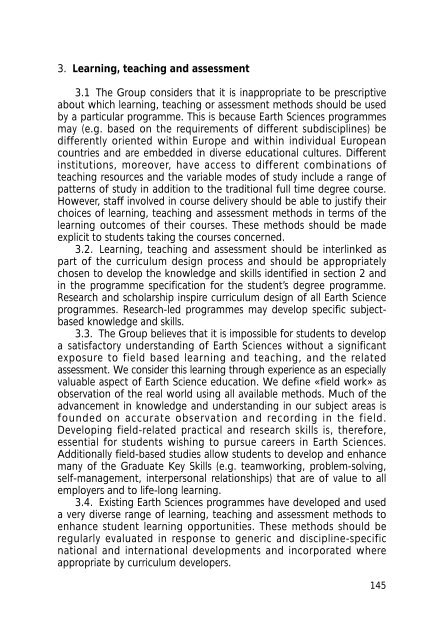Final Report Pilot Project - Relaciones Internacionales de la ...
Final Report Pilot Project - Relaciones Internacionales de la ...
Final Report Pilot Project - Relaciones Internacionales de la ...
You also want an ePaper? Increase the reach of your titles
YUMPU automatically turns print PDFs into web optimized ePapers that Google loves.
3. Learning, teaching and assessment<br />
3.1 The Group consi<strong>de</strong>rs that it is inappropriate to be prescriptive<br />
about which learning, teaching or assessment methods should be used<br />
by a particu<strong>la</strong>r programme. This is because Earth Sciences programmes<br />
may (e.g. based on the requirements of different subdisciplines) be<br />
differently oriented within Europe and within individual European<br />
countries and are embed<strong>de</strong>d in diverse educational cultures. Different<br />
institutions, moreover, have access to different combinations of<br />
teaching resources and the variable mo<strong>de</strong>s of study inclu<strong>de</strong> a range of<br />
patterns of study in addition to the traditional full time <strong>de</strong>gree course.<br />
However, staff involved in course <strong>de</strong>livery should be able to justify their<br />
choices of learning, teaching and assessment methods in terms of the<br />
learning outcomes of their courses. These methods should be ma<strong>de</strong><br />
explicit to stu<strong>de</strong>nts taking the courses concerned.<br />
3.2. Learning, teaching and assessment should be interlinked as<br />
part of the curriculum <strong>de</strong>sign process and should be appropriately<br />
chosen to <strong>de</strong>velop the knowledge and skills i<strong>de</strong>ntified in section 2 and<br />
in the programme specification for the stu<strong>de</strong>nt’s <strong>de</strong>gree programme.<br />
Research and scho<strong>la</strong>rship inspire curriculum <strong>de</strong>sign of all Earth Science<br />
programmes. Research-led programmes may <strong>de</strong>velop specific subjectbased<br />
knowledge and skills.<br />
3.3. The Group believes that it is impossible for stu<strong>de</strong>nts to <strong>de</strong>velop<br />
a satisfactory un<strong>de</strong>rstanding of Earth Sciences without a significant<br />
exposure to field based learning and teaching, and the re<strong>la</strong>ted<br />
assessment. We consi<strong>de</strong>r this learning through experience as an especially<br />
valuable aspect of Earth Science education. We <strong>de</strong>fine «field work» as<br />
observation of the real world using all avai<strong>la</strong>ble methods. Much of the<br />
advancement in knowledge and un<strong>de</strong>rstanding in our subject areas is<br />
foun<strong>de</strong>d on accurate observation and recording in the field.<br />
Developing field-re<strong>la</strong>ted practical and research skills is, therefore,<br />
essential for stu<strong>de</strong>nts wishing to pursue careers in Earth Sciences.<br />
Additionally field-based studies allow stu<strong>de</strong>nts to <strong>de</strong>velop and enhance<br />
many of the Graduate Key Skills (e.g. teamworking, problem-solving,<br />
self-management, interpersonal re<strong>la</strong>tionships) that are of value to all<br />
employers and to life-long learning.<br />
3.4. Existing Earth Sciences programmes have <strong>de</strong>veloped and used<br />
a very diverse range of learning, teaching and assessment methods to<br />
enhance stu<strong>de</strong>nt learning opportunities. These methods should be<br />
regu<strong>la</strong>rly evaluated in response to generic and discipline-specific<br />
national and international <strong>de</strong>velopments and incorporated where<br />
appropriate by curriculum <strong>de</strong>velopers.<br />
145


